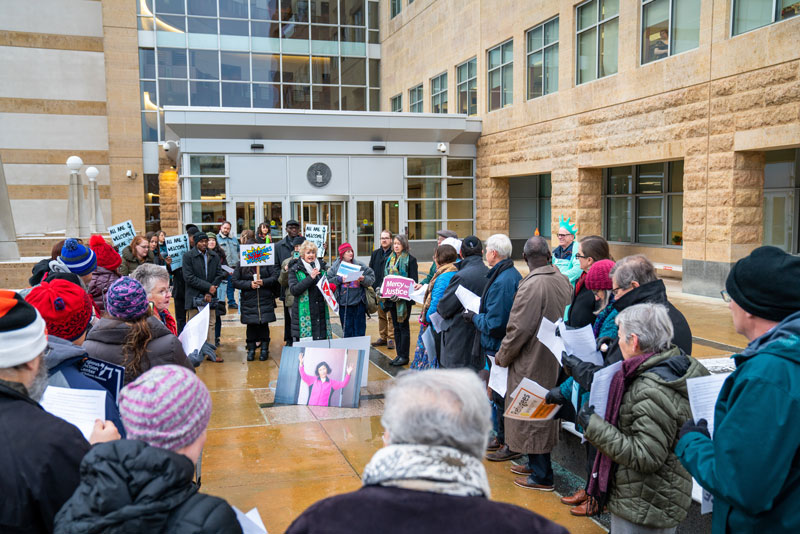Arguments Heard in HIAS v. Trump Appeal
By Sharon Samber, HIAS.org
Oct 28, 2020

Supporters of refugee resettlement gathered outside the U.S. District Court in Greenbelt, MD on January 8, 2020 before the oral arguments in a lawsuit brought by refugee agencies HIAS, CWS and LIRS began. Oral arguments in the appeal were heard October 27, 2020.
(Eric Kruszewski/HIAS)
HIAS argued in federal court on Oct. 27 that an injunction against President Trump's executive order giving states and local governments the power to refuse the resettlement of refugees should remain in effect.
HIAS and other resettlement agencies sued the Trump administration last year, hoping to block the executive order from taking effect. On Jan. 15, a federal district-court judge in Maryland granted an injunction in the case, HIAS v. Trump, that halted the order. The administration is now appealing that ruling, hoping to restore an unprecedented grant of power to state and local officials to essentially veto resettlement in their jurisdiction.
In remote oral arguments before a three-judge panel of the U.S. Court of Appeals for the Fourth Circuit, Justin Cox of the International Refugee Assistance Project argued on Tuesday on behalf of HIAS, Church World Service, and Lutheran Immigration and Refugee Service. He told the judges that Trump's executive order violates the intent of the Refugee Act of 1980, which calls for a national system of refugee resettlement.
Cox argued that there are numerous other reasons that the court could strike down the executive order. One reason could be its failure to account for state and local balance. There are many places for conflicts, he noted, as states and local officials may not be in agreement over accepting refugees. Some counties may also have leaders who are not elected, creating further complications.
“It’s plain that no one thought through how this would actually work on the ground,” Cox said.
In his January decision, federal district judge Peter Messitte stated that the executive order is likely unlawful as it "grants [states and localities] veto power" and that this “flies in the face of clear Congressional intent, as expressed in the legislative history of the statute.” In enjoining the order, he called for refugee resettlement to “go forward as it developed for the almost 40 years before Executive Order 13888 was announced."
The federal government argued that the order gives states a voice in the process rather than a veto. Amanda Mundell of the U.S. Department of Justice insisted the State Department, not state or local governments, makes the ultimate decision on where a refugee should be placed.
But there has been a pattern of government lawyers arguing in court that Trump's executive orders don't mean what they say, U.S. Circuit Judge Pamela Harris charged.
“The government comes into court and tries to pretend that these executive orders don't mean anything," Harris said. "I feel like we're not talking about the actual executive order we have in front of us."
People choose the language in an executive order with great care, Harris continued later. “It’s not written the way you are defending it,” she said. “We will just have to agree to disagree.”
U.S. Circuit Judge Barbara Milano Keenan also found fault with much of the government’s argument, calling the order an “edict without consequences.” She said implementing the order would create a chaotic situation because it contains no structure or procedures for carrying out its terms. “It’s so impractical,” Keenan said.
Even prior to the injunction, the premise of the administration’s order — to allow states and localities to stop refugees from resettling in their areas — had proven unsuccessful, with the overwhelming majority of both Republican and Democratic governors and county officials across the country voicing their continuing commitment to welcoming refugees.
HIAS President and CEO Mark Hetfield said at the time of the district court ruling that the Trump administration was wrong to attempt a state-by-state refugee ban.
The appeals court decision is expected soon. Whichever side is unsuccessful will be able to appeal the decision to the full circuit court or directly to the Supreme Court.